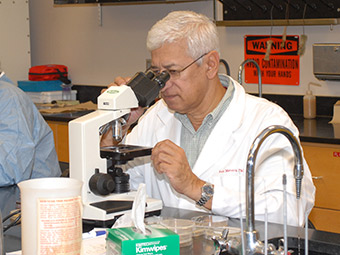Embryonic exposure to environmentally relevant concentrations of triclosan impairs foraging efficiency in zebrafish larvae
Document Type
Article
Publication Date
9-28-2018
Abstract
The ubiquitous and persistent contaminant triclosan is known to cause developmental and behavioral toxicity in fish, but few studies have evaluated the long-term effects of these responses. We used a phenotypically anchored approach to evaluate the behavioral responses caused by early exposure to environmentally relevant concentrations of triclosan to better understand the risk triclosan poses to fish. Zebrafish were exposed to 0, 0.4, 4, or 40 μg triclosan/L (nominal concentrations) for 5 d followed by depuration for 16 d to assess effects on mortality, development, and foraging efficiency. Because foraging efficiency can be impacted by neurological and structural alterations, we assessed morphological and behavioral indicators of neurotoxicity and morphology of craniofacial features associated with gape to identify potential underlying mechanisms associated with altered foraging behaviors. To our knowledge, we are the first to show that early exposure to environmentally relevant concentrations of triclosan impairs foraging efficiency in larval fish by 10%, leading to emaciation and reduced growth and survival. The cause of the impacts of triclosan on foraging efficiency remains unknown, because effects were not associated with overt indicators of neurotoxicity or grossly malformed craniofacial structures. Our results suggest that early exposure to triclosan has the potential to impact the sustainability of wild fish populations, and thus the mechanism underlying behavioral alterations following exposure to triclosan warrants further study. Environ Toxicol Chem 2018;37:3124–3133.
Recommended Citation
Wirt, H., Botka, R., Perez, K.E. and King-Heiden, T. (2018), Embryonic exposure to environmentally relevant concentrations of triclosan impairs foraging efficiency in zebrafish larvae. Environ Toxicol Chem, 37: 3124-3133. https://doi.org/10.1002/etc.4281
Publication Title
Environ Toxicol Chem
DOI
10.1002/etc.4281



Comments
© 2018 SETAC
https://setac.onlinelibrary.wiley.com/share/SM8QRGRUQIYH22NDYBDG?target=10.1002/etc.4281